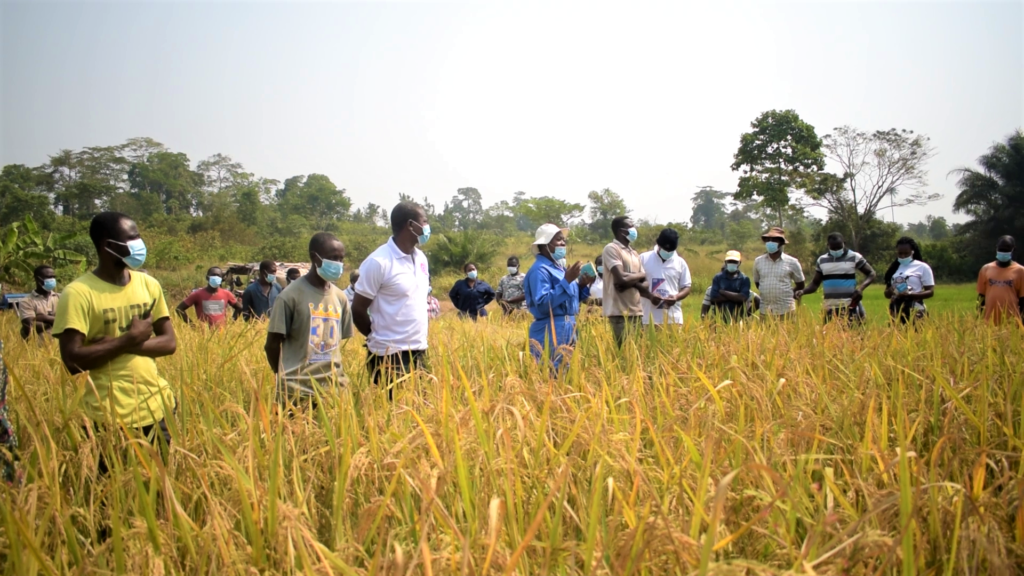Ghana spent an estimated total of GH6.8 billion in rice importation from 2017 to 2020 to supplement local production.
The increasing consumption of rice in the country has necessitated a local initiative to satisfy the demand and reduce cost of rice importation.
In a bid to have Ghana produce adequate rice locally, the Crops Research Institute of the Council for Scientific and Industrial Research is educating farmers on techniques to increase rice yields.
Local rice production in Ghana increased to 950,000 metric tonnes in 2020, with an annual increase of 60kg per person rice consumption.
However, current rice production meets less than 40% of the consumption requirement in Ghana.

The Bekwai municipality, like many rice farming communities, suffers lower and nutritious rice yields.
According to Director of Agriculture at Bekwai, Emmanuel Mensah, prior to the invention of the researchers, farmers within the municipality have had to deal with weed infestation in their rice farms.
“During the regional liaison meeting, we reported the issue of the different types of weed that affect the cropping of rice.
“So, we reported the issue to the researchers and they came up with a solution. The researchers indicated they have to demonstrate to farmers, some techniques they could employ to curtail the infestation of weeds,” he said.
Rice demand in the country is rapidly growing at 5% per annum which would require commensurable production.
Some rice farmers at Asanso, a suburb of Bekwai, share their farming experience prior to their exposure to the new technologies.
Amina Mohammed and Issah Nunfam, have been working as rice farmers for close to ten years now. According to Amina, the introduced variety and farming practices are better than their traditional style.
“I’ve been working on this farm for years, but there was no improvement. I used to employ the broadcast style of rice cultivation. These new technologies have been really helpful,” added Issah Nunfam.
To reduce Ghana’s cost of importing rice, researchers from the Crops Research Institute introduced the farmers to new rice farming technologies and improved rice varieties.
William Lelabi Kota, who is the lead technical advisor, indicated the majority of the farmers lacked the skills for rice cultivation.
“The main problem they faced was land preparation for cultivation. They prepare their lands poorly. They don’t make water bonds around their farms, so water control on their fields is difficult.
He revealed “the farmers were introduced to how to make bonds, water canals to allow water in or out, nursery preparations and transplanting of the nursery.
Latest Stories
-
Hindsight: Why Accra Lions’ present problems do not define them
10 mins -
10-year-old Lisa Laryea arrives at Wits Donald Gordon Hospital in South Africa for bone marrow transplant
35 mins -
23 ambassadors inducted to take on 2025 GSTEP Challenge in three regions
1 hour -
Ghana Shea Workers Union inaugurated
1 hour -
I trust Bawumia; he has never lied to me – Akufo-Addo
1 hour -
Bawumia is hardworking; offers the youth platform to share ideas – Kow Essuman
1 hour -
IGP, Police commanders worship with churches in Ghana as part of security arrangements for 2024 elections
2 hours -
Mahama is a failed president; give Bawumia a chance – Akufo-Addo to Ghanaians
2 hours -
‘No child left behind in Free SHS’ – Akufo-Addo declares
2 hours -
MMDAs tasked to pay more attention to TB cases
2 hours -
2024/25 GPL: Defending champions Samartex suffer second consecutive loss as Basake Holy Stars wins 1-0
2 hours -
Government stands firm in Galamsey fight, says Akufo-Addo
2 hours -
National Peace Council assures public of violent free elections
2 hours -
Agenda 111 to be discontinued if NDC comes to power – Akufo-Addo
2 hours -
Mahama begins 3-day tour of the Western Region today
2 hours

